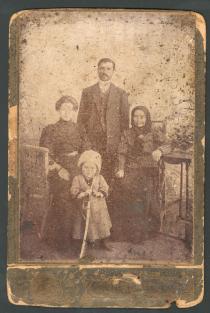From left to right: 1st in the third row: my stepmother's cousin, Grigory Kesselman; 1st in the second row: his wife Maria; in the first row: their children (two); 2nd in the second row: the mother of my stepmother, Sophia Brovarnik; 3rd in the second row: the father of my stepmother, Gershl Brovarnik; fourth in the second row: my stepmother, Fradl Grigorievna Levitas; 2nd in the third row: my sister Maria; 3rd in the third row: I; 4-th in the third row: my brother Boris; 5th in the second row: my father, Yankel Bentsionovich Levitas.
In 1924 Father got married the second time. The name of his second wife, my stepmother, was Faina Grigorievna, or Fradl. Before marriage she worked as a cook for an owner of a sugar factory named Brodsky, and, having married my father, she became a housewife.
In 1925 our family left for Mariupol because Father had no work and we were in need. We lived in misery. At first, when we settled in Mariupol, my father also went from house to house, took orders and sewed, but later he got a job as a cutter at a garment factory.
My older brother, Boris, was sent by Father to a grammar school. The rule in those times was like this: for a Jewish child to be admitted to grammar school, his parents were to pay not only for their kid’s studies, but also for the study in this same grammar school of one or two non-Jews. So Father had to pay both for Boris, and some Russian boy.
Father was not able to pay for my studies too, and so I went to work. It was in 1925. I worked as a tin worker with a Jewish foreman. The first year I worked unpaid and lived on Father’s money, and in the second year I got fifty kopecks a week, and in the third year I already received nine rubles a week, and then 22 rubles.
After finishing grammar school my older brother went to tailor school. In 1931 he was drafted into the army. He served in an aircraft regiment first, and then was enrolled in the fleet, where he became a captain, first rank. But then he got dismissed, for he was a Jew. He was in advanced years then and after his dismissal he lived on his pension.
My brother was married. His wife’s name was Anna Lvovna, she was Jewish. They had no children. Soon after his dismissal my brother and his wife left for Vitebsk [today Belarus]. Before, they lived somewhere in Ukraine. I don’t know why they left for Vitebsk. You see, I lived in Leningrad and my brother didn’t let me know of his news very often, although we had amicable relations with each other. They lived in Vitebsk to their dying days. My brother died in 1993, his wife died shortly after.
My sister Manya married a Russian man. Neither for my father, nor for anyone else in our family was this a tragedy. We didn’t mind it very much, though I doubt whether anyone of us would have wished to follow her example. She was a housewife. She married early – she was only 13-14 years old. Their son was born soon. When the Germans came to Mariupol in 1941, she pretended to be Armenian and fled. She died soon after the war, in 1947; she was hit by a car.
I worked as a tin worker, and in 1926 I was enrolled into the army. At first I was in Georgia, then in Armenia and in Turkmenistan. There I participated in battles against local bandits. I got wounded and returned as an invalid. Having done my service term, I came back to Mariupol. I worked again as a tin worker, then as a stove-maker and construction worker.




